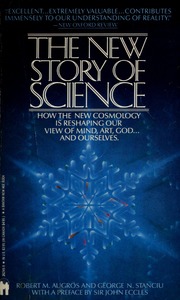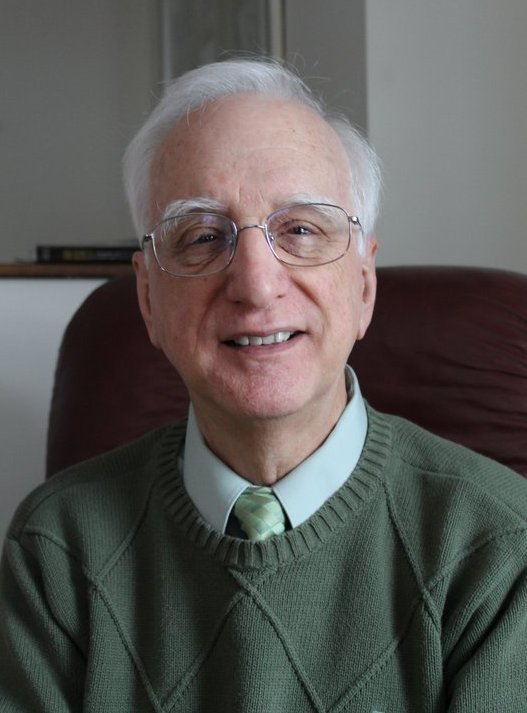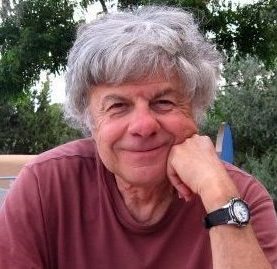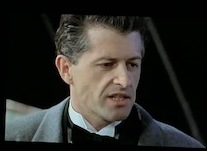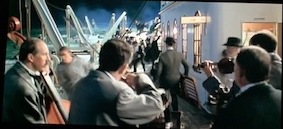|
home | what's new | other sites | contact | about |
||||||||||||
|
Word Gems exploring self-realization, sacred personhood, and full humanity
Editor's Essay, Part II Human Potential a godlike ability to rise above
return to "Human Potential" main-page
“…no planet, sun, or star could hold you if you but knew what you are.” Ralph Waldo Emerson
Augros & Stanciu's George Stanciu, PhD, theoretical physics
According to the Old Story of Science - Augros and Stanciu’s term for matter-based reality - human beings are the end result of an aggregation of sub-atomic particles, all coalescing in an upward spiral to form proteins, cells, and organs. In the "Evolution" series, we called this "upward causation." Man is seen to be a materialistic product of Newtonian physics. What humans are and do is deterministic, predictable, an outgrowth of Newton’s laws of motion. The mind cannot rule because it’s merely a by-product of matter. Free will is an illusion. As such, according to the “Old Story,” man is simply a machine. Every machine has a driving force that makes it work: steam, electricity, internal combustion, and the like. And so, the key to human psychology is that of identifying the driving forces of man: hunger, libido, instinct, passion. The Old Story views man-the-machine as completely determined, fixed, and labeled by innate driving forces. Hobbes, who wrote during the English Civil War and was loyal to the Crown, argued in his Leviathan that man is so besotted with base passions that, for society to function, a totalitarian state is required to keep law and order. Malthus, in his essays on population control, saw man’s hunger as the unbalancing factor concerning any hope for a just and well-regulated utopian society. Freud is famous for his emphasis on sexual impulse. He saw this as primary motivator of human beings. the behaviorists are closet-disciples of Newton Psychologists John B. Watson and B.F. Skinner invented and promoted “behaviorism” as a model to understand man-as-machine. It’s all stimulus-response, they said, just acting-reacting. Find the right hot-button, and you can predict what a person will do. People are merely higher forms of animals, just trying fulfill their instinctual needs. After the Second World War, however, in the 1950s, a new force in psychology began to emerge. This uprising was prompted by a sense that behaviorism had “led to the dehumanization of man in psychology.” Do we need, and is it even possible to meaningfully adopt, a model of what it means to be human? Why do we even need a model of humanity when we ourselves are human? Psychologist Irvin L. Child of Yale: “A model is a provisional parallel taken from something outside the subject itself. It is useful when the nature of a thing is remote or obscure. For example, Bohr’s planetary model of the atom is useful for certain purposes [because] we have no way of knowing what it feels like to be an atom. But we do have inside information about what it feels like to be human." Childs explains the fundamental orientation of the New Story of Science as it relates to human psychology: “Humanistic psychology is defined by [an] insistence that [it] will grow most usefully if … guided by a conception of man as he knows himself rather than by some nonhuman analogy... Humanistic psychology [is] viewed [as man] normally sees himself – as a person rather than only as an animal or a machine. Man is a conscious agent; that is the starting point. He experiences, he decides, he acts.” Psychologist Frank T. Severin adds an essential characteristic of humanistic psychology: “... consciousness or awareness is the most basic psychological process.” Further, “behavioristic theories of science are based to a large extent upon nineteenth century assumptions which are no longer considered valid.”
Editor's note: See the "Evolution" writing for much discussion on the untested, and unproved, underlying metaphysical assumptions of materialistic science.
Psychologist Carl Rogers: "... psychology has endeavored to walk in the footsteps of a Newtonian physics. Oppenheimer has expressed himself strongly on this, saying that the worst of all possible misunderstandings would be that psychology be influenced to model itself after a physics which is not there anymore, which has been quite outdated.”
modern psychology is built upon outdated and discarded precepts of physics Psychologist Rollo May: "I am continually impressed by the surprise registered by our scientific colleagues in other disciplines such as physics ... when they find us taking our models from outmoded forms of their science they have already discarded." Editor’s note: This is an extremely important point. Materialistic psychologists, the “behaviorists,” are like horses with blinders. They speak as if Isaac Newton’s deterministic cause-and-effect were still ruling science. They act as if Bohr and Heisenberg's discoveries never happened! The nature of reality, at its core, is not deterministic but probabilistic. The materialistic psychologists have built their model of man upon outdated and old-fashioned concepts of physics, as relevant as buggy whips and the horse-drawn carriage. And yet they will likely ridicule those who contest their fallacious notion that "man has no free will."
human beings have other basic needs beyond that of survival Psychologist Abraham Maslow criticizes those who reduce all human activities to drives and instincts: "Because the lowest and most urgent needs are material - for example, food, shelter, and clothing - they tend to generalize this to a chiefly materialistic psychology of motivation, forgetting that there are higher, non-material needs, as well, which are also basic." Psychologist Dr. Viktor Frankl: What are the spiritual goods of man? They can be divided into two broad categories: (1) the goods of the intellect, and (2) the goods of character… humanity's spiritual goods pull us and, unlike instinctual response, do not push or drive us to action The first thing we notice about these spiritual goods is that they are acquired only by free choice. “Values do not drive a man; they do not push him, but rather they pull him… There cannot exist in man any such thing as a moral drive, in the same manner as basic instincts. Man is never driven to moral behavior; in each instance, he decides to behave morally.” because the higher goods pull us, they have to be chosen The material goods can come to us from nature or by chance. A man may be born with bodily strength or he may win riches in a lottery. By contrast, one is a biologist or an honest man not by nature or by chance, but only by choice. The spiritual goods have to be chosen. Dr. Frankl, in his memoirs of the concentration camps, speaks of his associates becoming “saints or swine” according to their choices made under duress. The spiritual goods are the characteristically human goods. They are acquired only by choice. For example, no one can be involuntarily stripped of the goods of character. Someone can, by force, steal our belongings or attack us bodily. We can lose our material goods against our will. But no one can force us to be unjust or cowardly unless we consent. Others can treat us like animals, but whether we act like animals, even in a concentration camp, is ultimately up to us. The same holds for the intellectual goods. When all else is stripped from us, these remain. Dr. Frankl testifies that the spiritual goods give more strength than the bodily goods. He recalls how fellow prisoners at Auschwitz with inner spiritual resources fared better than others with superior bodily strength: “Sensitive people who were used to a rich intellectual life may have suffered much pain … but the damage to their inner selves was less. They were able to retreat from their terrible surroundings to a life of inner riches and spiritual freedom. Only in this way can one explain the apparent paradox that some prisoners of a less hardy make-up often seemed to survive camp life better than did those of a more robust nature.” That man can choose independently of his upbringing or history, that he can determine his own direction in life, not only confers upon him a great responsibility, it elevates him to a dignity far above that of the material world. Neuropsychologist, Nobel laureate, Dr. Roger Sperry: “Mind and consciousness are put in the driver’s seat … they give the orders, and they push and haul around the physiology and chemical processes as much as, or more than, the latter [biological] processes direct them. This scheme is one that puts mind back over matter, in a sense, not under or outside or beside it… The causal potency of an idea, or an ideal, becomes just as real as that of a molecule, a cell, or a nerve impulse.” The mind and will not only rule the body, they also rule and, when necessary, overrule the emotions, And with subordination of the emotions to reason, harmony and happiness become possible for man. Maslow, after extensive professional experience, describes the person who has harmonized all the parts of his nature, not by annihilating the emotions, but by directing them in accordance with the judgment of reason: how psychologically-healthy people view and live life “In healthy people only is there a correlation between … delight in the experience, impulse to the experience, or wish for it, and ‘basic need’ for the experience… Only such people uniformly yearn for what is good for them and for others, and then are able wholeheartedly to enjoy it, and approve of it. For such people, virtue is its own reward, in the sense of being enjoyed in itself. They spontaneously tend to do right because that is what they want to do, what they need to do, what they enjoy, what they approve of doing, and what they will continue to enjoy.” On the other hand, some persons choose habitually to indulge their passions even when they contradict what reason knows to be good. Inner discord characterizes such persons as Maslow explains: the psychologically-unhealthy experience inner discord and find their objects of desire to be poisoned “What he wants to do may be bad for him; even if he does it he may not enjoy it, he may simultaneously disapprove of it, so that the enjoyment is itself poisoned or may disappear quickly. What he enjoys at first he may not enjoy later. His impulses, desires, and enjoyments become a poor guide to living. He must accordingly mistrust and fear the impulses and enjoyments which lead him astray, and so he is caught in conflict, dissociation, indecision; in a word, he is caught in civil war.” material goods promote competition, spiritual goods lead us to cooperation Conflict between men seems to follow from the Old Story’s emphasis on material goods. Money and power, for example, do give rise to competition. But the spiritual goods do not. They are, by nature, common goods. They promote cooperation, since everyone can share in them without anyone’s portion being diminished. The spiritual values of truth, beauty, and goodness illustrate the point. the following story of a last-breath heroism is one of the most inspiring accounts I've ever heard Truth is a common good. Unlike material goods, it can be shared without loss. In Gulag Archipelago, Alexandr Solzhenitsyn describes a Soviet prison camp where a group of scientists and scholars, stripped of all bodily and external goods, are put to hard labor and given only a few ounces of bread a day: “At the Samarka camp in 1946 a group of intellectuals had reached the very brink of death: They were worn down by hunger, cold, and work beyond their powers. And they were even deprived of sleep. They had nowhere to lie down… Did they go and steal? Or squeal? Or whimper about their ruined lives? No! “Foreseeing the approach of death in days rather than weeks, here is how they spent their last sleepless leisure, sitting up against the wall: starved to death, frozen to death, worked to death, they now huddle together, in a final act, to share their spiritual and intellectual goods “Timofeyev-Ressovsky gathered them into a ‘seminar’, and they hastened to share with one another what one of them knew and the others did not; they delivered their last lectures to each other. “Father Savely, a priest academician, spoke of ‘unshameful death’, about patristics, about something in the area of dogmatics and canonical writings. “An electrical engineer [spoke] on the principles of the energetics of the future. “A Leningrad economist [lectured] on how the effort to create principles of Soviet economics had failed for lack of new ideas. “Timofeyev-Ressovsky himself talked about the principles of microphysics. “From one session to next, participants were missing – they were already in the morgue.” Augros and Stanciu: “What a magnificent tribute to the life of the mind! Not only are the spiritual goods always accessible, they can even be shared when all else is taken away… The generous, courageous, honest man is a benefit not only to himself but to everyone around him. A good man is a public good… Dr. Frankl records many acts of heroism: We who lived in concentration camps can remember the men who walked through the huts comforting others, giving away their last piece of bread. “Because the spiritual goods promote cooperation rather than conflict, Maslow concludes: We can now reject the almost universal mistake that the interests of the individual and of society are of necessity mutually exclusive and antagonistic [as Hobbes taught], or that civilization is primarily a mechanism for controlling or policing human instinctoid impulses.”
|
||||||||||||
|
|
